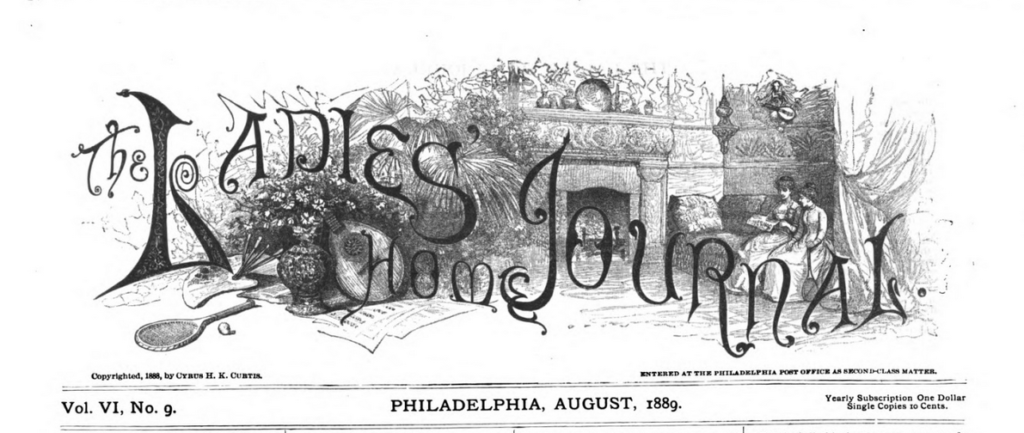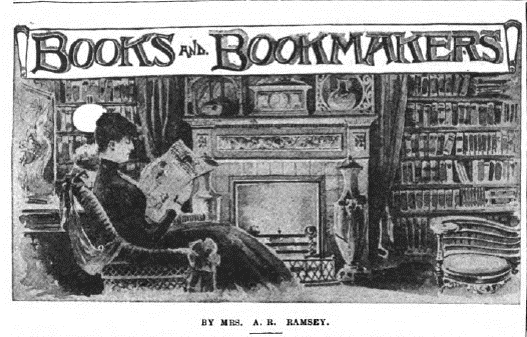One Issue, A Whole Lot of Gossip
Last week, I had the pleasure of giving a guest lecture as part of the University of Münster’s Lecture Series In the Mood for Affect. The title of my lecture was “Capitalizing on Intimacy: The Rise of Gossip in US American Periodicals” and in preparing for it I re-discovered one issue of Ladies’ Home Journal that is so wonderfully bananas when it comes to gossip that
a) I decided to dedicate an entire section of the lecture to this one magazine issue (the other two sections were focussed on the careers of Grace Greenwood and Anne Hampton Brewster and how they profitted off of their personal ties within the expatriate community in Italy, and on Town Topics‘ stylistic evocation of intimate familiarity among readers and between readers and “The Saunterer” respectively), and
b) I wanted to share it with you here, too:

Let’s start with a bit of context: Simultaneous with the rise in public gossip for which I argue, the nineteenth century also witnessed another crucial and related trend in publications, namely etiquette manuals. As John Kasson summarizes in Civility & Rudeness, the interest in manners is intricately connected to changes in the social make-up, most centrally, the national focus on social mobility: “Fundamental to the popularity of manuals of etiquette was the conviction that proper manners and social respectability could be purchased and learned” (Kasson 43). Hence, it is unsurprising that the same magazines which might write about public figures and thus profit from the interest in gossip reports about their activities, might nonetheless also feature advice columns that warn against gossip’s potentially disastrous social consequences. So, I know that from a financial and editorial point of view it makes a lot of sense for the two opposing takes on gossip (condemning it / selling it) to exist side by side. Nonethelles, I was still struck by how that plays out in the August-issue of Ladies’ Home Journal from 1889 (full text accessible via HathiTrust).
We start with a bit of (relatively tame) society news under the headline “Our Girl in the Summer” (5). After some general reporting on the new trends of young women on vacation, the article takes a slightly aprupt and surprising turn towards gossip:
People gossip ill-naturedly at watering-places who would scorn the pastime elsewhere: “I am ashamed of myself, but I have caught the infection,” confessed a girl of intelligence and breeding, in the course of our promenade on the piazza of a summer caravansary. “I study costumes, criticise manners and detect flaws in conversation here as I never did at home, and am not superior to the enjoyment of fancy dishes of gossip dashed with scandal. It must be in the air.”
Ladies’ Home Journal, August 1889, 5
The report’s author, Marion Harland, takes great pain to ensure that her readers know that what she is reporting on “fell under [her] personal observation” – thereby establishing a close relationship between recipient, spreader, and object of information that is characteristic of gossip.
While a bit unexpected as part of a “confession” of a girl in the summer, the content on gossip so far is, however, within the bounds of the expected: Gossip is bad and only for the “idle and vicious” (to quote Warren and Brandeis). Harland makes this paticularly clear by describing gossip as “a moral malaria” that befalls people when they are spoiled by “the intoxicating influence of the scene.” With this comparison between social and bodily illness, the August-issue takes up a thread introduced the month before in the recurring column “Mothers’ Corner” and its “Talk on Gossip.” The language here is entirely clear – if very weirdly metaphorical:

“I wanted to give you a little advice. … I’ll say to you, ‘Don’t! Don’t destroy your appetite for good, wholesome conversation by tasting and picking over first this and then that bit of gossip, until your palate is calloused, your digestion ruined, and you are chicken-breasted, hollow-cheeked and short-winded, mentally, and very likely sallow, morally. For, my dears, the love of gossip will grow upon you just as truly as the love of sweetmeats, or the love of fine clothes, if you let it”.
Ladies Home Journal, July 1889, 7
Gossip, makes you ugly, dear lady-readers! It will manifest physically, if you give in to temptation! One would think, the magazine’s position on gossip couldn’t be clearer. Returning to the August-issue, however, and leafing a few pages ahead, readers would encouncter the recurring full page column “Books and Bookmakers.” This one-page-section really is a treasure trove of trading public intimacy. “Books and Bookmakers,” I think quite interestingly, first offers an indictment of male critics of focus too much on women authors’ private lives in assessing the value of their books. As Mrs. A R Ramsay writes:
These young women who glory in writing books which their grandmamma’s blush to read are the exponents of a very bad element in some types of American maidenhood. “Let us be talked of,” they seem to say, “if not for our good deeds, then for our naughty ones, but talked of we must be.” And the critic comes forward and caters for this craze for notoriety, chronicles each movement, each detail of the private life, and pours into the public ear an appalling amount of scandal and gossip. If these men would ignore these girls, as women, and treat their books to serious criticisms, judging these by the best canons of art and judging these by the best canons of art and taste, these very unpleasant stories, with their abominable English —would soon cease to appear.
Ladies Home Journal, August 1889, 11

Yet on the very same page, visually presented as a subsection of “Books and Bookmakers,” this magazine also offers “Literary Leaves. Bright Gossip about those who write and make books.” In this column, readers encounter the very same strategiese employed in the foreign gossip of Brewster and Greenwood: a stress on personal acquaintance, a focus on private affairs, an address of readers as well informed and familiar. On Harriet Beecher Stowe (of all people!), for example, we find the following:
It is well known to the intimate friends of Harriet Beecher Stowe that she has ever had deep down in her heart a sympathy with the best elements of Catholicism. This fact is not familiar to the public, but I happen to know that some of Mrs. Stowe’s most cherished friends have been among the priesthood of the Roman Catholic Church. She has, an especial fondness for the crucifix, and in her bed-chamber hangs one which has been her constant companion for years. To a friend who asked her why she had it, she once remarked, “There is in my heart a need of some outward tangible symbol. I believe that in this world we must live by symbols, and this one is very essential to me.”
As if religion and faith weren’t already quite private topics, this little snippet ups the ante through reference to Stowe’s friends, by distinguishing the author and now their readers from the general “public” outside of the insider knowledge they share, which is aided by direct quotes spoken to a friend. And last but not least: the article mentions her BED CHAMBER of all places! I don’t think it gets more intimate than that?
While I could only offer a little snippet here, I nonetheless want to end with a suggestion of the myriad and contradictory functions fulfilled by gossip in the pages of Ladies‘s Home Journal, one of the leading magazines of its time: gossip becomes an highly valuable object of trade in reference to literary and other celebrities who are made part of the “public feminized space” (Okker) presented in the pagers of these magazines. Readers are invited to feel close to their famous contemporaries, who are – despite their public standing – portrayed in their private surroundings and in their domestic roles. Gossip, I argue, however also becomes a cover for the professional work done by women within these pages: under the headlines of “gossip,” “letter,” “conversation,” their skilled and public labor is made unthreatening and at least nominally placed back within the private sphere. Women both as readers and as authors are thus presented and addressed in the commercial, public outlets not as transgressing boundaries, but upholding them. This effect is further enhanced by the magazines repeated reminders that gossip, even as a domestic and private mode of communication, is to be avoided for its danger of moral depravity.
To come back to culinary metaphors of “Mother’s Corner”: if gossip were a sweet dish, Ladies’ Home Journal found a way to have it it’s cake and it it, too.